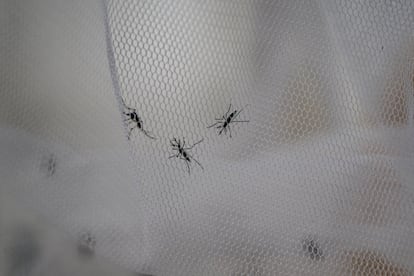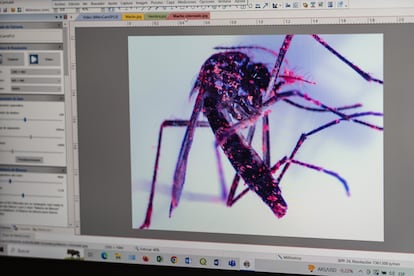An invasion of mosquitoes hits Buenos Aires
Experts blame the proliferation of ‘Aedes albifasciatus,’ the second in less than two months in the Argentine province, to the intense rains

Hordes of mosquitoes invaded Buenos Aires this week. This is the second time in two months that there has been a significant increase in these insects in the Argentine province. Specialists explain that the proliferation of Aedes albifasciatus — commonly known as floodwater mosquito — is a consequence of the intense summer rains in the southern hemisphere. Faced with the alarms raised by this second invasion, experts have informed that this species does not transmit diseases like dengue fever, although it has been linked to equine encephalitis, which mainly affects animals, and has already caused an outbreak in the country.
The explanation provided by scientists for this phenomenon is simple: the eggs laid by the female Aedes albifasciatus in the damp substrate can resist during long periods of drought and hatch when water from rainfall accumulates. This is how biologist Sylvia Fischer, a researcher at the National Scientific and Technical Research Council (CONICET), explained it during the first invasion in January, in a CONICET publication: “A large number of eggs had accumulated. When it began to rain continuously [...] these eggs all hatched synchronously, the larvae developed simultaneously and huge numbers of adults emerged, all at the same time.”
The January rains, as well as those that fell recently in the province of Buenos Aires, caused the “peaks of abundance” of mosquitoes that scientists describe. This second time, however, the invasion occurred “with more force,” according to biologist Victoria Micieli, because the eggs that did not hatch in January were joined by new eggs laid by the female mosquitoes that developed that time. “It is common for this invasion to occur every three years, but we did not expect the second one,” says Micieli, who is the head of the CONICET Center for Parasitological and Vector Studies. In that sense, explains the scientist, this week’s proliferation is “quite unusual.”
The Aedes albifasciatus is a mosquito that has a very wide distribution in Argentina, from the south, in the Tierra del Fuego province, to the north of the country. Invasions like this, Micieli points out, take place in different parts of the country at different times of the year. The insect, large in size, with a thin body and elongated legs, causes, above all, a lot of annoyance. It thrives in parks or squares. The females, which are the ones that bite humans, can be very aggressive. Specialists are studying the link of this species with equine encephalitis, a disease that in 2023 caused an outbreak in horses in the center and north of the country and caused at least 12 infections in humans, after more than two decades without records.
Specialists warn, however, that this species does not transmit dengue fever, whose vector is another mosquito, the Aedes aegypti, which is smaller, has white spots and reproduces mainly in water-filled containers inside or around houses.
Last Friday, the Pan-American Health Organization issued an epidemiological alert due to the increase in dengue fever cases in the Americas, where more than 670,000 positive cases have been recorded. In Argentina, there have been 48,366 infections since July 2023 and 35 people have died, most of them in the northeast of the country, according to the latest National Epidemiological Bulletin. Its neighbor Brazil is the country with the most registered cases in the region: more than 530,000 positive cases and 90 deaths, the worst numbers in 40 years. This week, Brazil became the first country in the world to include the dengue fever vaccine in public healthcare.
The ruling party blames the previous administration
The government of Javier Milei has taken advantage of this second invasion of mosquitoes, which has the media and social networks on alert, to attack the leftist Union for the Homeland, the main opposition coalition, which headed the government for the last four years. This Tuesday, the presidential spokesperson, Manuel Adorni, mixed “the proliferation of mosquitoes” with “the cases of dengue” in the same statement. “We don’t want to lose sight of the fact that a large part of this problem comes from the responsibility for the failure of the prevention policies that were implemented during the past year. Prevention was not well implemented,” said the official. The opposition responded on social media.
“To say that dengue fever is the responsibility of the previous administration [...] speaks of absolute ignorance of the cycle of the disease,” tweeted Fabián Puratich, former undersecretary of System Integration and Primary Health Care. “Incredible audacity,” declared Deputy Pablo Yedlin, who condemned the fact that the dengue fever vaccine, which was approved in November by the National Administration of Medicines, Food and Medical Technology, is not included in the vaccination schedule or being distributed for free in public hospitals: “There is a safe and effective vaccine. Any updates on that?”

Micieli, who has been researching mosquitoes for more than 30 years, maintains that “it is hasty” to hold a government responsible for the proliferation of Aedes albifasciatus, and that associating this increase with the increase in cases of dengue fever is “misinformation,” as they are two “completely different” species. In both cases, says the biologist, “it is not true” that there are no prevention policies. However, “it is insufficient, of course. Mosquito control requires a lot of financing.”
In response to the invasion of mosquitoes, the government of the City of Buenos Aires announced this week the reinforcement of operations in parklands and squares. Meanwhile, 31 miles from the capital, the municipality of La Plata announced that it will distribute 2,000 units of repellent free of charge, as there is a shortage of this product in stores and drugstores. The same thing happened in early January. Scientists explained that this is “one of the only tools that humans have to counteract the effects of mosquito invasions.” Experts estimate that relief will come in the next 10 to 15 days when the population of this species drops, although it will depend on whether it rains again.
Sign up for our weekly newsletter to get more English-language news coverage from EL PAÍS USA Edition
Tu suscripción se está usando en otro dispositivo
¿Quieres añadir otro usuario a tu suscripción?
Si continúas leyendo en este dispositivo, no se podrá leer en el otro.
FlechaTu suscripción se está usando en otro dispositivo y solo puedes acceder a EL PAÍS desde un dispositivo a la vez.
Si quieres compartir tu cuenta, cambia tu suscripción a la modalidad Premium, así podrás añadir otro usuario. Cada uno accederá con su propia cuenta de email, lo que os permitirá personalizar vuestra experiencia en EL PAÍS.
¿Tienes una suscripción de empresa? Accede aquí para contratar más cuentas.
En el caso de no saber quién está usando tu cuenta, te recomendamos cambiar tu contraseña aquí.
Si decides continuar compartiendo tu cuenta, este mensaje se mostrará en tu dispositivo y en el de la otra persona que está usando tu cuenta de forma indefinida, afectando a tu experiencia de lectura. Puedes consultar aquí los términos y condiciones de la suscripción digital.








































